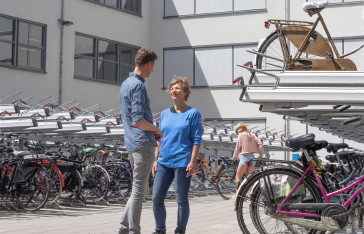Het accent binnen het hoger beroeps onderwijs heeft de laatste decennia gelegen op het begeleiden van de zwakkere studenten naar het niveau van beginnend beroepsbeoefenaar. De aandacht voor het uitdagen van de betere studenten is daarbij naar de achtergrond verschoven. Het gevolg is dat 37% van de studenten onvoldoende uitdaging vindt in het aangeboden onderwijs (Plasterk, 2007). Om gemotiveerde en getalenteerde studenten meer uit te dagen is op de Faculteit Gezondheidszorg van de Hogeschool Utrecht een Top Class programma ontwikkeld. Studenten krijgen in dit programma de mogelijkheid te excelleren, door middel van het doen van extra inspanningen. Dit programma is in zijn oorspronkelijke vorm vier jaar geleden van start gegaan. De resultaten van de evaluatie van het oude Top Class programma vormden de aanleiding om het programma te herzien. De methode die voor het herzien van het programma werd gebruikt is eerder beschreven in O&G (Coppoolse, 2009). Het afgelopen jaar is veel geïnvesteerd in de aanpassing van het programma en voorlichting aan studenten, docenten en management over het programma. Het nieuwe Top Class programma is onlangs van start gegaan. In het eerste gedeelte van dit artikel wordt het programma gepresenteerd. Vervolgens worden de eerste ervaringen met dit nieuwe programma weergegeven. Tenslotte wordt op basis van de eerste ervaringen geschetst wat vervolgactiviteiten zijn om studenten te faciliteren hun talent in te zetten bij hun verdere ontwikkeling.
DOCUMENT
Publicatie naar aanleiding van de internationale Master Class van Stadslab European Urban Design Laboratory. Onderwerp was het ontwikkelen van een regionale ruimtelijke strategie voor deze Poolse universiteitsstad. In de publicatie, naast de resultaten van de Master Class, ook essays van Ruud Vreeman, Ewa Kipta en Didier Rebois.
DOCUMENT

Publicatie naar aanleiding van de door Stadslab European Urban Design Laboratory georganiseerde Master Class met als thematiek het ontwerpen van een Innovative District voor de Poolse stad Lublin. De Master Class werd gevolgd door 8 internationale deelnemers en stond onder supervisie van Didier Rebois (Europan, Parijs), Marc Glaudemans (Fontys) en Juliette van der Meijden (Fontys)
DOCUMENT

All4Talent richt zich op alle arbeidsmarktprofessionals, arbeidsorganisaties en samenwerkingsverbanden die er alles aan doen om een inclusieve arbeidsmarkt te realiseren, in het bijzonder voor doelgroepen met een ondersteuningsbehoefte. All4Talent wil eraan bijdragen dat mensen met een kwetsbare arbeidsmarktpositie (kunnen blijven) meedoen. In het SPRONG-programma All4Talent wordt een toolbox ontwikkeld die bestaat uit nieuwe kennis, best practices, producten en diensten en manieren om samen te werken richting een inclusieve arbeidsmarkt. De betrokken partners werken in een kennisplatform samen aan kennisuitwisseling en -ontwikkeling. De SPRONG-subsidie biedt de onderzoeksgroep ruimte om kennis en tools te ontwikkelen voor het beter inzetten van werknemers en -zoekenden die aan de zijlijn staan.

A fast growing percentage (currently 75% ) of the EU population lives in urban areas, using 70% of available energy resources. In the global competition for talent, growth and investments, quality of city life and the attractiveness of cities as environments for learning, innovation, doing business and job creation, are now the key parameters for success. Therefore cities need to provide solutions to significantly increase their overall energy and resource efficiency through actions addressing the building stock, energy systems, mobility, and air quality.The European Energy Union of 2015 aims to ensure secure, affordable and climate-friendly energy for EU citizens and businesses among others, by bringing new technologies and renewed infrastructure to cut household bills, create jobs and boost growth, for achieving a sustainable, low carbon and environmentally friendly economy, putting Europe at the forefront of renewable energy production and winning the fight against global warming.However, the retail market is not functioning properly. Many household consumers have too little choices of energy suppliers and too little control over their energy costs. An unacceptably high percentage of European households cannot afford to pay their energy bills. Energy infrastructure is ageing and is not adjusted to the increased production from renewables. As a consequence there is still a need to attract investments, with the current market design and national policies not setting the right incentives and providing insufficient predictability for potential investors. With an increasing share of renewable energy sources in the coming decades, the generation of electricity/energy will change drastically from present-day centralized production by gigawatt fossil-fueled plants towards decentralized generation, in cities mostly by local household and district level RES (e.g PV, wind turbines) systems operating in the level of micro-grids. With the intermittent nature of renewable energy, grid stress is a challenge. Therefore there is a need for more flexibility in the energy system. Technology can be of great help in linking resource efficiency and flexibility in energy supply and demand with innovative, inclusive and more efficient services for citizens and businesses. To realize the European targets for further growth of renewable energy in the energy market, and to exploit both on a European and global level the expected technological opportunities in a sustainable manner, city planners, administrators, universities, entrepreneurs, citizens, and all other relevant stakeholders, need to work together and be the key moving wheel of future EU cities development.Our SolutionIn the light of such a transiting environment, the need for strategies that help cities to smartly integrate technological solutions becomes more and more apparent. Given this condition and the fact that cities can act as large-scale demonstrators of integrated solutions, and want to contribute to the socially inclusive energy and mobility transition, IRIS offers an excellent opportunity to demonstrate and replicate the cities’ great potential. For more information see the HKU Smart Citieswebsite or check out the EU-website.

Met het nieuwe Innovatietraineeship verbinden mkb’ers zich voor langere tijd aan een hbo-talent, eerst student-afstudeerder en vervolgens als trainee. Met het Innovatietraineeship ontstaat een nieuwe type trainee en breidt Saxion haar palet aan samenwerkingsmogelijkheden uit rondom onderzoek met het mkb. Saxion wil bouwen aan • een hechtere onderzoeksband met regionale mkb-bedrijven; • kansen voor hbo-talenten in innovatietrajecten als start van hun carriere; • sterkere en verbonden mkb-bedrijven met innovatiekracht Actieve communities en bestaande samenwerkingsverbanden, passend binnen de nationale KIA’s en de Saxion zwaartepunten, gaan de innovatietrainees opnemen in hun midden. De essentiele driehoek van bedrijven, onderzoekers en studenten wordt benaderd en gematched door Saxion contactpersonen via hun communities, via onderzoekers en via afstudeercoordinatoren. De mkb-bedrijven bieden een afstudeertraject als een volwaardig innovatietraject. Begeleiding en ondersteuning van onderzoekers wordt ter beschikking gesteld. De trainees doorlopen een serie masterclasses waarin zij Technologie Innovatie Processen leren sturen, met het innovatietraject in het mkb-bedrijf als concrete casus. Zo mogelijk wordt een koppeling gelegd met externe financiering. Het traineeship programma zal aankomende trainees met aandacht door spannende fases loodsen, zeker in de huidige corona-tijd. Begeleiding voor studenten richt zich op ondersteuning in de vele onzekerheden van persoonlijke groei, programma fases en de dynamiek van innovatieve bedrijven. De plaatsing van studenten als afstudeerder start februari 2021, in September 2021 starten de trainees voor een jaar. Het project wordt afgesloten eind 2022 met een landelijke evaluatie. Saxion gebruikt de pilot om een nieuw traineeship te ontwikkelen. De uitvoering vindt daarom plaats bij het Centrum voor Ondernemerschap, naast Fast Forward. Projectmanagement en het ontwikkelen van het traineeship in samenhang met onderzoek gebeurt vanuit de Research & Graduate School. Saxion zal voortgang en resultaten monitoren om van te leren en zal worden gedeeld met andere hbo’s en SIA. Voor besluitvorming over volgende cohorten wordt een business case ontwikkeld.